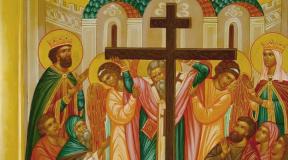Tell your son Pinchas Polonsky to read. The civilized rabbi-mathematician Pinchas Polonsky invented a fragment of the New Testament to denigrate Christianity ____________________
Pinchas Polonsky. Jewish view of Christianity.
M .: Knizhniki, 2015 .-- 299 p.
The author of the book "The Jewish View of Christianity" Pinchas Polonsky is widely known in the field of religious Jewish education (and in its Zionist segment) both in Israel and in Russia. He owns many books and articles, mainly on the topics of biblical history and Judaism, written in popular language for a wide audience, but nevertheless having a solid research basis.
Polonsky's religious views are in line with the ideas of the so-called orthodox modernization, which, unlike the reformation in Judaism, does not provide for the breakdown and restructuring of the main provisions of religion, but the preservation of its orthodoxy, while simultaneously adapting in some, no longer the most key aspects to modern times and the world ... The idea of \u200b\u200b"orthodox modernization" became fundamental for the so-called religious-Zionist wing of modern Judaism. It is known that at a certain historical stage, secular Zionism and Judaism acted as alternatives to each other. "Religious Zionism", therefore, is an attempt, if not to unite, then not to oppose these two principles. On the whole, the position of Pinchas Polonsky is fueled by the ideas of the first chief rabbi of Israel, Abraham Yitzhak Cook (1865-1935). Cook, in particular, formulated the idea of \u200b\u200bJudaism as a universal religion for all mankind, and understood Christianity and Islam as "Judaism for non-Jews."
It is from this point of view that Pinchas Polonsky examines in his book the problem of the two thousand-year history of the relationship of Jews with Christianity (not with Christians, but with Christianity as a teaching). To the pivotal question, asked in the book, why Jews cannot accept Christianity, despite their common spiritual roots, the author answers according to the rules of mathematical logic (he is a mathematician by basic education).
The first and foremost point is the strict monotheism of Judaism. The author points out that “the higher power that created the world and man and continues to determine and direct all events in it is not an impersonal power ... but a personality. God created man in His own image ... And treats him like his son. " This latter, points out Pinchas Polonsky, is the key to understanding a person in Judaism. For him, the exclusivist application of the definition "son of God" only in relation to Jesus Christ, key for Christianity, is unacceptable, because such an approach makes it defective, profanes the universal character of religion, and therefore, to some extent, the principle of the unity and omnipotence of God the Creator.
The second key point for all Abrahamic traditions, arising from "ethical monotheism", which has received the definition of "Judaism" in history, is the eschatological messianic perspective. According to the Jewish understanding, the Messiah, as a royal anointed one, will establish his authority not only over the Jewish people, as Isaiah says (2: 4): “and all nations will hammer swords into plowshares ...” and “the whole earth will be filled with the knowledge of the Lord” ( Isa 11: 9). That is, until these tasks begin to be implemented in reality, it is impossible to talk about the coming of the Messiah, which indicates a strong rejection of the principle of Jesus' messianism, which is also fundamental for Christians. Polonsky formulates in his book the opinion that Jesus was one of the Pharisee teachers of the "Hasedean" persuasion, distinguished by an increased faith in miracles. He and his mission were, according to the author, too embedded exclusively in the Jewish national environment and its problems, which makes impossible a universal messianism.
Nevertheless, despite the fact that Judaism and Christianity at the level of faith are in no way connected in our days, we can say that the tough antagonism between these religions, which in the past led to bloody tragedies, is being overcome today. Polonsky believes that if for 2 thousand years the relationship between Jews and Christians was built on the basis of the so-called theory of substitution, according to which Christianity replaces Judaism, then now they are being formed on the basis of what the author calls the “theory of complement”, according to which both religions, recognizing common spiritual sources, nevertheless, they do not strive for confrontation with the aim of winning one over the other, but coexist independently and in their own right within the framework of what can be called "progressive Divine Revelation."
Many people ask themselves the questions: why the relations between religions originating from the same root (Judaism, Christianity, and now also Islam), throughout their history, were distinguished by permanent antagonism and how to overcome this antagonism? It seems that Pinchas Polonsky's book, albeit in a small way, contains the answer to this question.
Chapter 13. Further Contribution of Judaism to the Religious Progress of Humanity
The greatness of the Jewish contribution of antiquity to the religious progress of mankind is evident and recognized by all. Jewish people created the Bible (or, in another formulation, the Jewish people were able to achieve to become an instrument of transmitting Divine light to mankind, a “collective prophet” through whom God gave the Bible to mankind) - and the Bible, of course, is the basis for building Western civilization. But is this the end of the contribution of Judaism to the spiritual progress of mankind, or is this just the beginning, and the Jewish people will also have to reveal to mankind new levels of understanding of Divinity in the future? On this issue, the views of Judaism and Christianity usually differ.
From the point of view of classical Christianity, everything important in revealing the Divine light to humanity has already happened, already in the past. Since the Messiah Christ has already come, “has already brought salvation into the world”, then our business is only to perceive this and join him (0 \u003d “believe”). From the Jewish point of view, the revelation of the Divine light to humanity is still far from complete. This revelation took place not only in biblical times, but it continued throughout history - and, most importantly, continues to this day. And just as in the past, the Divine light was revealed to humanity through the Jewish people, so through the Jewish people this light will continue to open to humanity in the future.
However, there is no consensus in Judaism about how specifically this further disclosure can occur. Below we present one of the approaches to this problem, developed by one of the greatest Jewish philosophers of our century, Rabbi Abraham - Yitzhak Cook (1865-1935), the creator of the philosophy of religious Zionism and the concept of "orthodox modernization" in Judaism, Chief Rabbi of the Land of Israel in 1904-1935 biennium
1. Monotheism as the main Jewish contribution to civilization. The essence of monotheism as a Dialogue
Jewish history is divided into two parts: the first era - from the forefathers to the end of the 2nd century. n. e., when the center of Jewish life was the Land of Israel, and the second - from the 3rd to the 19th century, when the people lived in Exile. (In our time, as the Jewish people return to their Land, this second period ends, and Jewish history moves to its new stage.)
First period contribution jewish history in world civilization huge, but if you try to formulate all this contribution in one phrase, in one main idea, then it will be aversion from idolatry and, of course, the idea of \u200b\u200bethical monotheism, originally proclaimed by Judaism and then, through Christianity and Islam, spread to the entire Western civilization. This concept is based on the ethical responsibility of man in the face of Divine love and consists in the fact that God created man in His image and likeness, like His son (and therefore loves him), put in him freedom of choice, various skills, abilities, reason, feelings , gave man commandments and ideals, gave man a mission and set a task for him - and then now God leads a Dialogue with man. (Actually, the meaning of human creation "in the image and likeness of God" is precisely to create an opportunity for such a dialogue - after all, we will carry out dialogue only between the like.) Everything that we do, think, decide, everything that we do , - this is our “word” in the Dialogue with God (ie, our “words” are, first of all, our actions). And everything that happens around us and happens to us, the way the world answers us, is the “word of God,” God's answer to us. (It is monotheism that is fundamentally important here, because it is possible to perceive life as a single Dialogue only when different phenomena occurring in the world are perceived as manifestations of a Single Personal Power, which wants to tell us something and hear an answer from us.) Thus, ethical monotheism considers the whole universe, the whole the world as the space of the Dialogue between man and God. In this dialogue, God demands from man "responsibility to God." (This feeling can also be called responsibility to Life, to national history, to humanity "- all these in practice are almost equivalent concepts, and it is they, that is," global responsibility ", that are the source of ethics.) The most important part of this Dialogue is" responsibility before the image of God in man, called conscience. " In this Dialogue with God, during his individual biography, a person comprehends and discovers, and for himself for others, this or that revelation of the Divine light.
It is precisely the ethical monotheism formed in Judaism that in the past was the central contribution of Jewry to world culture and civilization, and through Christianity and Islam, he spread throughout humanity.
2. Two levels of a person's Dialogue with God: individual and general - National
However, as Rav A. - I. Cook notes, in the original Divine revelation, in the Torah, we were given not one, but two central ideas. The first idea, the idea of \u200b\u200ban individual Dialogue between man and God, has already been adopted by humanity from Judaism and has already "digested". But there is also a second great idea, which humanity has not yet grasped, although it is also found in the Hebrew Bible, in the Tanakh - that is, in a book that mankind has recognized as sacred. This idea is also the idea of \u200b\u200ba Dialogue, but not an individual one, but a general - National - that is, “Dialogue with God of the whole people as a whole”. At the same time, the people are also perceived as a Personality, as an organic entity extended along history, that is, consisting of all their generations, not only living ones, but also past and future generations. Each of the peoples has its own "soul", its own special talents and capabilities, peoples have commandments (duties) and ethics of national behavior, their own specific mission and task. Every nation, as well as every person, is given freedom of choice. And each nation, as a whole, conducts its own Dialogue with God. All actions, deeds, decisions of the people - all these are the words that the people say in their Dialogue with God. And everything that happens to this people is the words of God addressed to them. And just as an individual comprehends the Divine light in the process of his individual development, conducting a Dialogue with God within the framework of his individual biography, so the people comprehend the Divine light from their national development, conducting a Dialogue with God within the framework of their national biography, which is called "national history". (The subject of such a Dialogue with God in the course of history is the people as a single Personality in all their generations, and not individuals, because the scale of historical \\
events and their duration is much longer than an individual life.)
In other words, the second main idea The Hebrew Bible is the idea that God is revealed to mankind not only through the revelations of the prophets, but also in the course of a "natural" historical process. And therefore history requires the people of its religious understanding; and just as an individual should analyze his achievements and failures, his merits and his sins in his Dialogue with God and correct them - so should the people. The revelation of God to man continues throughout the entire history, including today's, - and we must try to grasp what God wants to tell us and accept His word within the framework of the personal responsibility of each of us for the history of our people.
(In Judaism there is also the idea of \u200b\u200ba general - Human Dialogue with God; however, the national level does not disappear at all, just as the individual level does not disappear in a general - National dialogue. Thus, the general - Human Dialogue with God is the integration of national Dialogues.)
It should be noted that both the idea of \u200b\u200ban individual and the idea of \u200b\u200ba “general” (general - National and general - Human) Dialogue with God are given in the Torah from the very beginning. The Torah begins with two accounts of the history of the creation of man; at the same time, in the first presentation (Gen. 1: 1-2: 3), a person created “in the image of God” appears primarily as a “generic concept”, with all of humanity as a whole; and only in the second (Gen. 2: 4-3: 24) - an individual concept. Having created man, God tells him: "Be fruitful and multiply, fill the earth and rule over it" (Gen. 1:28). This commandment (and this is generally the first commandment given in the Torah) obviously applies to all of humanity as a whole. Man, a single humanity - during his life, filling the world and building civilization, conducts Dialogue with God; and the power of man over nature (such as how worthily a person disposes of this power), including science and technology, as well as literature, art, social order, relations between people and social groups - all these are different parameters of this Dialogue. After the division of humanity into separate nations (during the epoch of the construction of the Tower of Babel) - the general - Human Dialogue with God was also supplemented by National Dialogues.
All further biblical narration, the books of the Torah and the Prophets are imbued with the idea of \u200b\u200ba general - National dialogue with God. The Jewish people, Israel, appears in the biblical text as a person with free will, behaving sometimes well and sometimes badly, but always - in those cases when there is a general - National actions - bearing responsibility for their actions.
Awareness of the general - National Dialogue with God is expressed in the "sacralization of history", that is, the perception of history as one of the forms of Revelation. Therefore, in particular, the historical records of the nearly thousand-year history of Ancient Israel, i.e., the books of Judges and Kings, were included in the Bible (i.e., they received the status of Revelation).
At the level of the TaNaKh, in the era of the Hebrew Bible, the ideas of individual and national Dialogue are equally present, united. But in the future, the fate of these two ideas - both in the Jewish people and in all of humanity - turned out to be very different.
3. Transmission to humanity, through Christianity and Islam, the idea of \u200b\u200bindividual dialogue with God
So, at the beginning of its history, during the period of the First Temple (up to the 5th century BC), the Jewish people had a vivid feeling of both these levels of Dialogue with God, and sometimes it even happened that the national dialogue manifested itself more strongly during this period. than an individual dialogue.
However, it was impossible to convey both these ideas to humanity at once - and the essence of Jewish chosenness consists precisely in the transmission of the Divine light to the peoples of the world - it was impossible. Firstly, humanity would not be able to perceive two such great ideas at once - this, apparently, would be overwhelming for him. And, secondly, even in the Jewish people themselves, these ideas were not sufficiently balanced, and in general, the National Dialogue with God at first developed better than the individual one (i.e., the perception of God in national life was stronger than the perception of God in life individual) - and therefore it was necessary to strengthen the sense of individual dialogue within the Jewish people themselves. Therefore, during the period of the Second Temple, for about five hundred years (V century BC -
1st century n. BC), the awareness of the general - National Dialogue was "reduced" and gradually disintegrated, so that by the end of the period of the Second Temple in Judaism there was only awareness of the individual Dialogue. It was at this moment that Christianity emanated from Judaism, which spreads among humanity and brings the Jewish idea of \u200b\u200bmonotheism to the peoples of the world at the level of individual Dialogue with God. And the Jews, having lost their statehood and therefore lost the general national level of the Dialogue, even in physical sense and having gone into Exile, they also remained within the framework of only an individual Dialogue with God, in order with its help to correct themselves on an individual level.
Thus, Christianity is a “daughter enterprise” of Judaism during the period of the end of the Second Temple (or, in the more usual formulation, “a daughter religion in relation to Judaism”), providentially designed to convey monotheism to humanity at an individual level. Christianity contributing to spiritual development of humanity, developed an understanding of individual dialogue with God, and made it, through the image of Jesus, available to many hundreds of millions of people. At the same time, the approach of Christianity turned out to be consonant, first of all, with the Japhetic (European) peoples; and therefore, for the Semitic and other "near and middle eastern" peoples, another "subsidiary of Judaism" was subsequently created - Islam, which carries the idea of \u200b\u200bindividual monotheism to these eastern peoples. Through Christianity and Islam, the Jewish idea of \u200b\u200bindividual monotheism spread and was accepted by the majority of humanity.
4. The Jewish mission today is in transferring to humanity the idea of \u200b\u200ba common - National and (further) general - Human Dialogue
Over the past two thousand years, both of these processes - the perception of the concept of a Personal God and individual Dialogue by all mankind, as well as, in parallel, the Jews' correction of themselves on an individual level - have come to an end. To date, almost all of humanity has already "digested", adopted the Jewish ideas about the One Personal God, His love for man, about the commandments, about the individual Dialogue of man with God and about everything that relates to this (at first, these ideas were adopted in the West, but today the Far Eastern mankind is also rapidly westernizing, and its mass consciousness adopts "Western" ideas, basically Jewish). And the Jews themselves, being in scattering, over the past centuries have corrected themselves at the individual level. Therefore, as Rav A. - I. Kuk points out, in our era the time has come for the Jewish people to begin to prepare themselves for the transmission of the second Divine idea to humanity, the idea of \u200b\u200ba common - National Dialogue.
For this, the Jewish people must first revive in themselves an understanding and a living feeling of this common - National level of Dialogue. And this is precisely the religious meaning of the fact that Zionism appeared and the State of Israel was created: so that the Jewish people, through the experience of the development of their Country and through the experience of religious responsibility for it, could revive in themselves the awareness of the national Dialogue with God, i.e. the Jewish people in the State of Israel are called to revive the biblical level of spirituality, and then gradually teach this to all of humanity.
Thus, the modern approach to Judaism developed by R. A. - I. Cook, includes several closely related ideas: general - National Dialogue, sacralization of history, religious Zionism, the principle of Continuing Revelation and the scheme of "orthodox modernization" of religion (we will consider them in more detail below). The actualization of all this “Divinity in real life”, The spirituality of this world and its further transmission to humanity - and will be the main Jewish spiritual task for the foreseeable future, this is where the Jewish chosenness and mission is realized today.
5. Balance of individual and general - National types of Dialogue with God. Raising the level of responsibility
It should be emphasized here once again that the activation and revival of the level of the general - National Dialogue with God (and through this - the nationwide spiritual life, nationwide moral responsibility, etc.) in no way diminishes or cancels the individual Dialogue. In the process of human advancement, nothing previously achieved on the basis of an individual Dialogue (i.e., understanding the importance of personality as an image of God on earth, its value and cosmic character, its rights and responsibilities, etc.) should not be canceled or diminished. However, the idea of \u200b\u200bindividual Dialogue with God alone (which has ensured the progress of Western civilization for the last two thousand years) is now not enough. The "motor" of this idea has already worked out the motor resource that this idea could realize alone; and the spiritual crisis that is coming today in the West because of this can only be overcome by the fact that the idea of \u200b\u200ban individual Dialogue with God will be supplemented by the idea of \u200b\u200ba general - National Dialogue - which, together with the first, should lead humanity further.
It is also important to note that the idea of \u200b\u200ba “national organism as a Personality and its dialogue with God” is as far from primitive “hurray nationalism” as the idea of \u200b\u200b“the value of a person as an image of God” is far from primitive “egoistic human self-adoration”. Awareness of national - state life not just as a process of improving interpersonal relations in society, but as a Dialogue between the people and God that lasts for centuries - does not lead to a decrease in the level of responsibility of an individual, but, on the contrary, to an increase in this level. In the general - National Dialogue with God, each individual person is not a mute "cog", but rather an active and independent "motor" on which he is entrusted. responsibility for the movement of the entire machine as a whole. In other words, if in the usual Western concept of an individual Dialogue with God, a person is assigned moral responsibility only for his own individual behavior, then in the concept of “general - National Dialogue with God”, each individual person is assigned responsibility before God for the behavior of the entire national organism.
This responsibility, of course, is purely moral - just as purely moral, and not at all legal, is the individual responsibility of a person before God for his personal behavior. However, it is precisely this expansion of the sense of responsibility that completely changes the relationship of values \u200b\u200bin society and the direction of its development.
The spread of the concept of "individual monotheism" (that is, individual Dialogue), which began in humanity two thousand years ago, imposed on the individual much more moral obligations than it was before, in the era of paganism, and thereby greatly contributed to the process spiritual growth civilization of the West. (For in general, the level of development of a society is proportional to the level of moral responsibility that the culture of this society imposes on a person. The more personal moral responsibility of everyone for everything that happens around, the more social and spiritual progress.) Accordingly, the spread of the concept of a general - National Dialogue with God, imposing an even greater moral responsibility on the individual (which is possible only because humanity is already prepared for this), will be a prerequisite for a new essential breakthrough in the advancement of humanity - a breakthrough comparable to that that occurred two millennia ago as a result of the spread of the idea of \u200b\u200bindividual Dialogue.
6. Dialogue with God of all mankind as a whole
We have already noted above that the idea of \u200b\u200ba common - National Dialogue with God, in which each of the peoples appears as a "national personality", does not, of course, negate the fact that also all humanity is a single whole, which also leads our "common - Human Dialogue ". In the course of this Dialogue, the entire history of mankind should be perceived as a single “communication protocol”: everything that humanity does, all its “actions” and “decisions” are the word that Man wants to say to God, and everything that happens to humanity, is the word that God says to Man.
If a person feels his personal responsibility for this general - Human Dialogue with God - then this, of course, is wonderful and is an even higher level of spirituality than his responsibility only for the Dialogue of his own people with God. However, there are two significant problems here that cannot be ignored.
(1) General - Human should not replace or displace the national. On the contrary, it should complement and strengthen it, just as, for example, the national level should not crowd out the family level, but, on the contrary, should complement and strengthen it. In other words, the path to universalism (\u003d universal) lies not at all through cosmopolitanism (\u003d rejection of one's nationality), but, on the contrary, through correctly and constructively realized nationalism (\u003d care and responsibility for the constructive and moral advancement of one's national existence). Therefore, in reality (and not in declarations) only those who already feel responsibility for their people can rise to the next step - to feel responsibility for humanity. Without this talk
about "a sense of responsibility for all of humanity" will be just empty words designed to justify the lack of a sense of responsibility for the fate of their own people.
(2) Just as the people have a full-fledged "general - National Dialogue with God" is possible only if there is one or another form of a national state, within which the people can take "general - National actions" - so for humanity, full implementation “A sense of responsibility before God for the behavior of all mankind” will become possible only when all of mankind is so united that it will feel itself as a single organism making common responsible decisions. This level presupposes not only a total cessation of wars, but also an end in general of "conflicts for displacement" between peoples, which means a psychological restructuring and an expansion of the feeling of love for one's neighbor to such an extent that the awareness of the success of any other group of humanity would be perceived by everyone as their own success (like, for example, people today rejoice at the successes of "their athletes", "their country and state", etc.). Such a level (of course, still very, very far from being reached today) exactly corresponds to the famous prophecy of Isaiah about the coming of the Messiah / Messiah: “And they will hammer [all nations] swords into plowshares, and spears into sickles, the people will not raise a sword against the people, and they will no longer learn to fight ... and the whole earth will be filled with the knowledge of the Lord. "In other words, the arrival of the Messiah / Messiah is not at all" the end of History ", but the beginning of a new stage, when humanity will begin a dialogue with God as a whole (at the same time without losing national and family structures!)
The further course of the Dialogue of Mankind with God is endless.
7. The religious value of the development of civilization and the concept of "Continuing Revelation"
Feeling not only the individual, but also the wider (general - National or general - Human) level of Dialogue with God gives us another very significant change in our religious ideas. Namely, it gives us the opportunity to perceive the development of the surrounding life and the world - including the progress of civilization, the development of culture, science, moral values society, its social structure, etc. - not just "human progress", but as an integral element of the Continuing Revelation, requiring the development and modernization of religion (while maintaining, of course, its orthodoxy!)
Let's consider this important issue in more detail. Usually, in religious concepts (of all religions), the entire "Divine Revelation" is entirely concentrated in the initial moments of this religion; and a person's further business is only to study, perceive and accept what has already been discovered. For example, the usual approach in Christianity emphasizes that all the Revelation necessary for mankind is already contained in the Bible, and our business is only to "believe and accept this Revelation." In Islam, this idea is emphasized by the fact that “Muhammad is the last of the prophets,” and after him mankind does not need any prophets, and further prophecy and revelation is impossible. Yes, and in Judaism, one can often come across a point of view that emphasizes that "everything has already been revealed at Sinai, and then we should only study and implement the tradition." However, the approach to this problem in the framework of the developed p. Cook of ideas for "orthodox modernization".
After all, if history is the Voice of God, and God continues to conduct His Dialogue with the Jewish people and with humanity, then in this Dialogue He necessarily continues to tell us something new, because otherwise it would not be a Dialogue, but a reading of the Book, and God would not be really our Interlocutor. This means that the new disclosure of Divine Revelation continues today.
In other words, the concept of "Continuing Revelation" states that Revelation did not cease in antiquity at the time of the creation of religion, but that it continued and continues now; and at the same time it is expressed not in prophecy, not in "miracles" or mystical "voices from Heaven", but in the most ordinary course of human history, in the development of science, culture, morality, society; and above all - in the course of Jewish history. And in order to hear this Revelation, we must consider history not just as a set of human achievements, but as a Dialogue of peoples and Mankind as a whole with God, and try to isolate the Divine "message" addressed to us from the course of history. Perceiving and accepting it, religion develops, promotes and modernizes. (But since at the same time we can in no way give up the previously said "Divine words", then we do not lose anything from the achieved religion earlier, and therefore our approach to religion will remain orthodox, that is, there will be "orthodox modernization of religion ").
The concept of "Continuing Revelation" revived and actualized at the beginning of the 20th century p. Cook, however, is not "completely new" in Judaism. This idea is rooted in many Jewish sources, and above all in the Hebrew Bible, in which the prophets for many centuries (after the giving of the Torah at Sinai) continued not only to transmit Revelation to us, but also taught us to see the Divine word in the course of history. However, during the nearly two thousand years of the Exile and the Scattering, when the Jewish people faced, above all, the task of surviving and preserving, the ideas of religious development and Continuing Revelation receded into the background. And only in our time, in connection with the creation of the State of Israel and the activation of the Jewish community - the National Dialogue with God, the idea of \u200b\u200bContinuing Revelation also returns to its place in Judaism - and then can be perceived by humanity, giving an impetus to the development of "orthodox modernization" in Christianity and Islam. (Note that in Western Christianity this is exactly what began to happen in our century - see above chapters 10 and 11). Let us emphasize once again that such modernization is not at all a "reform" and does not mean a departure from the previous religious heritage. After all, along with the fact that the current course of history is thought of as a Revelation, which therefore must be integrated into religion, the entire previous course of history, including the original Revelation of the beginning of religion and its further development, cannot be removed anywhere either. In the course of today's Dialogue with us, God does not say anything that would contradict His previous words; for every Divine Word and promise is eternal, and the former cannot be canceled. In other words, the previous Revelation is never canceled, but it must constantly develop and supplement. Thus, the idea of \u200b\u200ba general - National and general - Human Dialogue with God naturally leads to the principle of "Continuing Revelation", and this - to the concept of "orthodox modernization". And then it opens the way to a return to the religion of creativity, to the true religious creativity - the creativity of the development of religion itself while maintaining its orthodoxy. For only a "renewed and modernized, but at the same time orthodox" religion can provide society with an adequate basis for its further development.
Following this path, having learned to develop the new in religion, without discarding the old, we will be able to move forward in solving the tasks and tasks that God sets before us and asks us in the course of history.
And in this regard, "complement theology" and open Judeo-Christian dialogue can greatly facilitate such progress.
Chapter 14. Addendum: Questions and Answers
1. I understand your explanation about faith, but what about hope and love? ..
2. The closeness of God and man
3. Complement theology: does the idea of \u200b\u200bthe salvation of Christianity contradict the idea of \u200b\u200bsalvation of Judaism?
4. Abrahamic unity: common inheritance, when it is impossible to combine
5. Is Judaism's Mission in the World Exhausted?
6. The level of man's standing before God
7. Sacrifice of blood to atone for sins
8. “Jesus took upon himself the sins of the world”?
9. Messiah - man or God?
10. So who is right?
Two thousand years together. Jewish attitude towards Christianity
Foreword
Although the period of Jewish - Russian contacts lasted only two hundred years - the history of Jewish - Christian relations, within which and in the context of which the Jewish - Russian space exists, is exactly ten times longer, as much as two millennia. There is a "classical part" in these relationships - that is, how these relationships were established in the initial period after the separation of Christianity from Judaism and how they continued for many centuries, and the modern part is how over the last century, literally on our eyes, both Orthodox Judaism and Orthodox Christianity are changing. Today, concepts that seemed unshakable for millennia are being revised and corrected, and this happens not as a result of reform or the formation of new sects, but in the course of "orthodox modernization", when a new direction in the development of a given religion fully retains its orthodoxy and at the same time is modernized.
During all " classical period”An open dialogue between Christianity and Judaism was impossible, since the goals of Christianity in this“ dialogue ”were purely missionary: where by preaching, and where by pressure to force Jews to abandon Judaism and convert to Christianity. In such an environment, Judaism's natural defensive reaction was to erect a wall between the Jewish and Christian spiritual worlds.
However, in our time, this state of affairs began to change. In the second half of the 20th century, there were serious positive shifts in the theological position of Christianity in relation to Judaism. In most Western Christian denominations (Catholics and most of the Protestants), the process of rethinking Judaism and a principled rejection of missionary work towards the Jews began, ie, the recognition that even from the point of view of Christianity, the “First (“ Old ”) Testament”, that is, the original Covenant of God with the Jews continues to operate, for the word of God is eternal and cannot “become dilapidated”, outdated or “canceled”; and therefore the Jews (unlike other nations of the world) "are saved through their Covenant with God and do not need baptism for this." (Some Christian theologians even emphasize that “Christian missionary work towards the Jews, based on the denial of the efficacy of the First Testament, offends God,” see below for more details.)
This emerging serious change in the position of Christianity (so far only part of it) makes it possible for Judaism to also take a more open position, which together creates the hope that the parties, for the first time in many hundreds of years, can begin a real dialogue aimed at mutual understanding, and not at persuading the opponent.
The change in positions of both Christianity and Judaism was caused by the theological understanding of the Holocaust and especially the theological understanding of the creation of the State of Israel - this amazing fact of the return of Jews to their country after a two thousand year absence. And this return has - no less global spiritual and religious significance than the destruction of the Jerusalem Temple that occurred two thousand years ago and the beginning of the expulsion of Jews from the Holy Land, which historically (and no coincidence) coincides with the beginning of the spread of Christianity.
And if we really believe in God and perceive history not just as a routine mixture of intrigue, economics and politics, but as a Dialogue between God and humanity, we must try to understand what God today, by the current course of history, wants to tell us.
Book structure
Introductory part. Two thousand years together
General overview of the process of the emergence of Christianity from Judaism and general principles of the relationship between Judaism and Christianity in their historical perspective.
Part one. The Impossibility of Combining: Why Christian Faith Is Not Suitable for Jews
This part is devoted to the classic and standard problems of Jewish - Christian relationships; she explains why the faith of Christianity - despite the fact that Christianity itself arose out of Judaism and has done so much for the spiritual progress of mankind - is not suitable as a faith for the Jews.
This part does not pretend to say a new word in theology. To a greater extent, it is just an educational program, basic knowledge - without which, however, it is impossible to discuss the problem and conduct a dialogue.
Part two. The need for awareness of complementarity: modern dialogue between Judaism and Christianity.
This part is devoted to the new aspects of Jewish - Christian relations that have emerged over the past century. Today, many branches of Christianity have abandoned "replacement theology" ("Christianity instead of Judaism") and moved to "complement theology" - including the principled rejection of Christianity from attempts at missionary conversion of Jews and recognition of the religious value of Judaism. Accordingly, in this part we consider the elements of the emerging dialogue that can develop between Jews and Christianity in such a situation.
Of course, both Judaism and Christianity represent a huge and wide space, with many different schools, approaches and points of view. It would be impossible to fit all these options into a book, so we sometimes say "the position of Judaism" or "the position of Christianity", meaning only their usually accepted point of view, the mainstream, despite the fact that in both religions there is a wide range of possible approaches, differing in their details.
Since we would like to keep the volume of the book small, we also did not include many more specific questions, possible objections and answers to them, etc. All this material, as a "supplement to the book", we plan to post on the site Machanaim www.machanaim.org, in the section “Judeo - Christian Relationships”.
Additional topics that you would like to consider, your questions and comments you can send to the address We will try, as far as possible, to answer your requests.
* * *We would like to express our deep gratitude to all those who supported the creation of this book: Oleg Evdokimenko, Elena and Natalia Gitel, Eli Brodsky, Lilya Tsinkovskaya, the organization "Jews for Judaism", Alex and Natalia Katz, the Mikhail Cherny Foundation, Dmitry Radyshevsky, and Charitable Foundation "Russian Jewish Congress".
Pinchas Polonsky, "Mahanaim", Beit El - Jerusalem
Introductory part. Two thousand years together
General overview of the relationship between Judaism and Christianity, in their historical perspective
(AND). Judaism as a universal religion
1. Religion for all mankind
Both Judaism and Christianity recognize the holiness and divinity of the Hebrew Bible (TaNaKh, aka “ Old Testament"- the first, original section in the Christian Bible) and the truth of everything that it says. Thus, both of these religions recognize that the Jewish people play a special role in the transmission of Divine Revelation to humanity.
This Divine Revelation is intended for all mankind, but it was transmitted through the Jewish people. The transmission of Revelation began with Abraham (c. XX century BC), continued through Moses (with the Bestowal of the Torah at Sinai, XV century BC) and then went through the very history of the Jewish people, captured in the Bible, and, above all, through the prophets of ancient Israel - David, Solomon, Isaiah, Jeremiah and many others. The transmission of this revelation is the essence Judaism.
Thus, Judaism from the very beginning is a universal, universal religion, and the Jewish people is only a messenger, a “channel” in the transmission of the Divine Light to humanity.
2. Basic principles of Judaism
The concept set forth in the Jewish Biblical Revelation - that is, the universal concept of Judaism, "ethical monotheism" - did not even have a close resemblance to any religious system of those times. Its main principles were:
and) High powerwho created the whole world and man and continues to direct the world and determine all events in it - this is not an impersonal "world law" of idolaters (such as Greek rock, Indian karma, Chinese "law of heaven", etc.), but it is a Person, which we call God.
b) God created man in His own image and likeness - because God loves man, wants good for man, and takes care of man's development. Any person on earth has a divine soul, is "the image of God on earth" (and this is the Jewish idea of \u200b\u200b"God-man"). God treats man as His son, that is, God is not only the incomprehensible Creator of the universe, but also the Father, who is close to each of us.
"The Lord appeared to Abram and said to him: I am God Almighty ... I AM THIS COVENANT WITH YOU ... circumcise your foreskin ... Eight days from birth, may every male [baby] be circumcised for your generations" (Genesis 17: 1 -12).
Note, God said to the ancestor of the Jews and all nations, he said specifically about Himself that He is the Covenant between Abraham and Him - God. And the sign of this Covenant was the circumcision of babies. What was it talking about? What message did it carry?
The covenant of circumcision bore witness to the birth of a boy, not by the power of male "dignity", but by the power of the One who spoke of Himself to Abraham as of the Covenant with him, the sign of which would be the miraculous birth of a boy, beyond the power of human laws.
“Is there anything difficult for the Lord? At the appointed time I will be with you in next yearand Sarah [will have] a son ”(Gen. 18:14).
Isaac, like circumcision, became a symbol of this covenant, which was still to take place in the future. And Almighty God was to become the executor of this Covenant over Himself.
“The one who causes childbirth from the beginning; I am the first Lord, and in the latter I am the same ”(Is.41: 4).
In the latter, He is the same as? What does it mean?
“So the Lord Himself will give you a sign: behold, the Virgin will receive and bear a Son in her womb, and they will call His name Immanuel” (Isa.7: 13,14). “Which means: God is with us” (Matthew 1:23).
Abraham was told that God is His Covenant, not circumcision. It was only a sign of God's circumcision over Himself.
“And the Lord said to Moses, saying: Say to the children of Israel: if a woman conceives and gives birth to a male [baby] ... on the eighth day his foreskin will be circumcised; and THIRTY-THREE DAYS should she sit, being cleansed of her blood; she should not touch anything sacred, and she should not come to the sanctuary until the days of her purification are fulfilled ”(Lev. 12: 1-5).
Thirty-three is a very significant number, isn't it? The woman in the Bible is represented by the Church, the people of God. In whose life these thirty-three days have come true - a day in a year, as it requires to understand holy Bible any prophecy? After all, sacrifices indicated future benefits?
So, the only husband who was born not because of the "masculine power" hidden in the laws of the flesh, but through the power of the Holy Spirit, was Jesus Christ, whose days of life on earth were formed at 33 years old.
Conclusion: God told Abraham about Himself as a Covenant for him, the power of this Covenant was revealed literally by the birth of Isaac from Sarrina's dead womb, so what? So that the One Who calls forth childbirth from the Beginning, Himself was born into this world as a Man. God became related with people, and the entire religion of the Jews was a prophetic letter from God for them, and all nations, for the sake of the expected meeting of the Creator with His creations, who were captured by sin and Satan.
“If I had not come and spoken to them, they would not have had sin; but now they have no excuse for their sin ”(John 15:22).
“Therefore I told you that you will die in your sins; for if you do not believe that it is I, you will die in your sins. Then they said to Him: Who are You? Jesus said to them, Jehovah from the beginning, just as I say to you ”(John 8: 24,25).
The Brooklyn Bridge is, of course, a luxury, but I will not rip the Kipchak off my temple. “The Brooklyn Bridge is, of course, a luxury,” wrote the “proletarian” poet VV Mayakovsky, thus expressing his admiration for the New York landmark. "The greatest luxury in the world is the luxury of human communication," the French aristocrat Antoine de Saint-Exupery reminded mankind. Teleconference Kiev - Jerusalem is gradually becoming “not a luxury, but a means of teaching”, which appears in the schedule of “Midrashi Zionit” every two weeks. But this regularity does not turn it into an ordinary event and does not deprive the participants of the feeling of festivity of what is happening. This time the meeting at Za-screen was devoted to different aspects of the Great Feast of Freedom: its deep meaning, metaphysics and specific laws of Passover. The Jerusalem quorum consisted of Shlomo Naaman, Tzion Abramov, Rabbi Shimon Ar-Shalom, and Doctor Pinchas Polonsky. The intellectual potential of the Kiev audience was reinforced by the head of the Bnei Akiva organization in Ukraine, Yakov Shumyatsky, and the envoy, David Weinstein, whom midrashists appreciate for both meaningful lectures and genuine attention to people.
At the beginning of the conference, Rav Ar-Shalom spoke about some of the laws of Passover as vividly and interestingly as, in accordance with the instructions of Shulchan Aruch, one should read Haggadah. Although Rabbi Ar-Shalom did not have a supply of nuts to encourage attention, the audience “went out loud” (as they would describe what was happening in the 19th century), receiving clear and specific directions.
Due to the fact that Passover this year begins at the end of Shabbat, the procedure for preparing for the holiday is somewhat unusual. Chametz is “wanted” on Thursday evening, and it is destroyed on Friday morning. On Shabbat, two sets of bread, carefully insulated from other products, remain - for the first and second meals. After the morning meal, the remnants of the leaven should be immersed in some substance that makes it completely unsuitable for eating. And finally, having "dealt" in this way with the remnants of bread, one should pronounce "bitul" - the formula for canceling an unnoticed and not found boor.
Discussion flared up around the question of selling khatts. Pinchas Polonsky expressed the opinion that the sale of the hamts is not obligatory, since the house is not a store, and there are no large stocks of a flour house. All the leaven that is left can be eaten before Passover, distributed, and presented to neighbors. To this Shlomo Naeman objected that the sale of the hamts is of fundamental importance. There are many products that are obviously kosher and are not directly included in the concept of "chametz". For example: candy, jam, tuna in their own juice. But, if the packaging does not say "Kosher for Passover", it is possible that some of the components of these products can be classified as chametz. And in rice groats, for example, a grain of wheat can be caught. By selling to a non-Jew all the products that are not used during Passover, you are guaranteed to get rid of a boor that you do not even know about.
David Weinstein asked a question regarding the reading of the Haggadah. Why is it so important to emphasize that the chosenness of the Jewish people manifested itself in the form of "Egyptian executions" - in such a cruel way? The audience heard three versions of the answer to this important and somewhat sensitive question. 1) Explanation of Shimon Ar-Shalom: On the night of the Passover Seder, it is very important to emphasize that "Egyptian executions" are a manifestation of the chosenness of the people of Israel, showing the full depth of this chosenness. The Almighty intervenes in creation, changing the laws of the universe, in order to make explicit the chosenness of the Jewish people. The Almighty rules the Jewish people through the commandments. Egyptians who resist the liberation of the Jewish people are governed by the Creator in a "language" they understand - executions. It is calculated that total number executions, mentioned by the sages of Aggadah, is equal to 613. 2) Interpretation of Shlomo Naaman: The chosenness of the Jewish people was manifested not at all in a cruel, but in a merciful way. The Almighty restored justice by destroying evil, punishing those who drowned Jewish babies, those who oppressed and destroyed the Jewish people. The universe comes from a good beginning. The destruction of carriers of evil, like the steam, Hitlers, and others like them is the greatest mercy. The world without them is much more perfect than the world in which they exist. Pinchas Polonsky's version was heard a little later, and we will give it "in the order of its arrival." Before bidding farewell to the audience, Rav Ar-Shalom told a story from his own childhood. As the youngest in the family, he had to open the door for the prophet Eliyahu. Eight-year-old Shimon was shy in front of the dense darkness of a long corridor, which had to be run to the door. And opening the door was also not very pleasant. Who lived next door? But the night of the Seder is called "Leil Shamurim" - the night of the protected, the night of freedom, when the Jews are not in danger, when the connection with the Almighty is especially palpable. And this feeling helped him to overcome both fear and the gloomy labyrinth of the Soviet apartment ... The dot, or rather, the ellipsis, was put at the end of the first part of the teleconference by Zion Abramov. He reminded the audience not only of how the Haggadah begins, but also how it ends - about the “operative part”. Although everything is infinitely important, the last phrase defines the goal. "LE", - said Zion, following the Rashi tradition in the interpretation of prepositions in Hebrew, - is a particle of the future tense, and there are still several months before the new year. Le Shana ha-Baa be-Yerushalayim ha-bnuya - "By next year in rebuilt Jerusalem"!
After the break, Dr. Polonsky captured the audience's attention. It would seem that everything possible has already been said. But “it never happened that something was not,” as Joseph Schweik used to say. Pinchas Polonsky would not have been Dr.Pinchas Polonsky if he had nothing to add. He quoted an interesting midrash, from which it follows that the uniqueness of the Jewish people also lies in the fact that they are not the son of their country. He has neither Fatherland nor Motherland. The Jewish people are the mature (and sometimes infantile) spouse of Eretz Yisrael. The life cycle of the people began with the descent of Jacob with children to Egypt, which can be considered as conception. The increase in the people in Egypt is like pregnancy. “Egyptian executions” are like birth pains, “a rather problematic process,” as Pinchas Polonsky defined it. This was the third version of the "answer to David Weinstein". Then the sea parted, and the birth of the people took place, literally the process of childbirth - "Exodus". Receiving the Commandments and Torah on Mount Sinai is a learning process. Then comes the marriage. The people of Israel went to Eretz Yisrael to give birth to the Messianic Light in marriage with her.



















